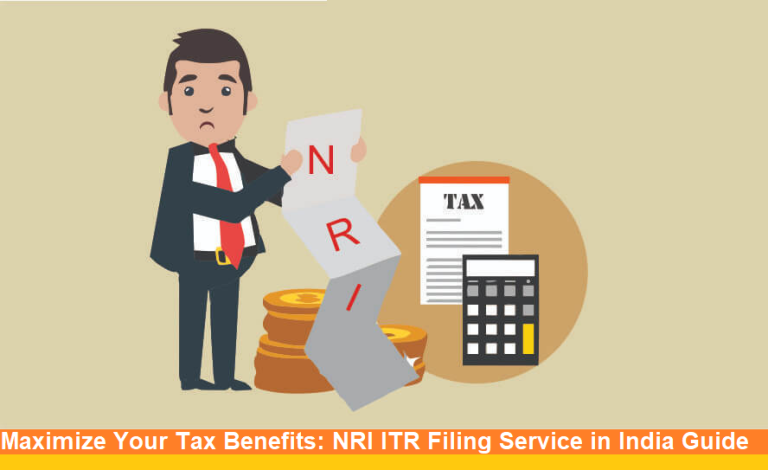Are you a Non-Resident Indian (NRI) looking to maximize your tax benefits in India? Look no further! Our NRI ITR Filing Service in India Guide is here to help you navigate the complex world of tax filing and ensure you make the most of the available deductions and exemptions.
Understanding NRI ITR filing
Filing your Income Tax Return (ITR) as an NRI can be quite a daunting task due to the specific rules and regulations that apply to non-residents. Understanding the nuances of NRI tax filing is essential to ensure compliance with Indian tax laws and to optimize your tax benefits. Our guide will break down the complexities of NRI tax filing, making it easier for you to grasp the requirements and procedures involved.
As an NRI, it's crucial to be aware of your tax obligations in India, even if you earn income abroad. Filing your tax returns correctly and on time not only helps you stay compliant with the law but also allows you to take advantage of various tax benefits that can reduce your overall tax liability. With the right knowledge and guidance, you can make the most of the opportunities available to NRIs for saving on taxes.
Navigating the tax landscape as an NRI requires a clear understanding of the different categories of income, exemptions, and deductions that apply to non-residents. By familiarizing yourself with the basics of NRI tax filing, you can ensure that you leverage all the available benefits and avoid potential pitfalls that may arise during the filing process.
Importance of filing your taxes as an NRI
Filing your taxes as an NRI is not just a legal requirement but also a strategic financial decision that can have a significant impact on your overall tax liability. By fulfilling your tax obligations in India, you can avoid penalties and legal issues while also benefiting from tax-saving opportunities that are specifically designed for NRIs.
Proper tax planning and timely filing of your tax returns can help you optimize your finances and ensure that you are making the most of the available deductions and exemptions. Whether you earn income in India or abroad, understanding the importance of filing your taxes as an NRI is key to managing your tax liabilities effectively and maximizing your savings.
Engaging in proactive tax planning and staying informed about the latest developments in NRI tax laws can empower you to make informed decisions that align with your financial goals. By prioritizing tax compliance and leveraging the available tax benefits, you can secure your financial future and make the most of your NRI status.
NRI tax benefits
One of the key advantages of being an NRI is the access to various tax benefits that can help you reduce your taxable income and lower your overall tax liability. Understanding and leveraging these tax benefits is essential for maximizing your savings and optimizing your financial planning as an NRI.
Some of the common tax benefits available to NRIs include exemptions on certain types of income, deductions for specific investments and expenses, and tax credits for taxes paid in foreign countries. By taking advantage of these benefits and structuring your finances accordingly, you can minimize the taxes you owe and retain more of your hard-earned money.
It's important to note that the tax benefits available to NRIs may vary based on your residential status, nature of income, and other factors. By working with tax experts who specialize in NRI taxation, you can identify the tax-saving opportunities that are most relevant to your situation and implement strategies to maximize your benefits.
NRI tax filing requirements
As an NRI, you are required to file your tax returns in India if you meet certain criteria, such as earning income in India or having taxable income that exceeds the basic exemption limit. Understanding the specific tax filing requirements for NRIs is crucial to ensuring compliance with Indian tax laws and avoiding any penalties or legal issues.
NRI tax filing requirements may differ based on the source of income, residential status, and double taxation avoidance agreements between India and other countries. By familiarizing yourself with these requirements and seeking professional guidance when needed, you can navigate the tax filing process smoothly and fulfill your obligations in a timely manner.
In addition to filing your tax returns, NRIs may also need to report certain financial transactions and foreign assets to the Indian tax authorities. Staying informed about the latest regulatory changes and disclosure requirements can help you stay compliant and avoid any potential issues related to non-disclosure of income or assets.
Steps to file your NRI ITR in India
Filing your Income Tax Return (ITR) as an NRI involves several steps that need to be followed diligently to ensure accurate and timely submission. Understanding the process of NRI tax filing and the documentation required can help you streamline the filing process and avoid any errors or discrepancies that may arise during assessment.
The first step in filing your NRI ITR is to determine your residential status for the relevant assessment year based on the number of days you have spent in India. Once your residential status is established, you can proceed to gather the necessary documents, such as PAN card, Form 16, and details of foreign income, to support your tax return.
Next, you will need to choose the appropriate ITR form based on the nature of your income and the exemptions or deductions you wish to claim. Filling out the form accurately and disclosing all relevant details is critical to ensuring that your tax return is processed smoothly and without any delays. Finally, you can e-file your NRI ITR through the official income tax portal or seek assistance from a professional tax filing service for expert guidance.
Documents required for NRI ITR filing
When filing your Income Tax Return (ITR) as an NRI, it's important to gather the necessary documents to support your tax return and ensure compliance with Indian tax laws. Having the right documentation in place can help you accurately report your income, claim deductions, and avoid any discrepancies that may trigger tax notices or audits.
Some of the key documents required for NRI ITR filing include your PAN card, Form 16 (if applicable), bank statements, details of foreign income, TDS certificates, and investment proofs for claiming deductions. Additionally, you may need to provide documents related to any foreign assets or investments held during the assessment year.
Keeping your documents organized and up to date can simplify the tax filing process and enable you to file your NRI ITR accurately and efficiently. By maintaining proper records and ensuring that all required documents are in order, you can minimize the risk of errors or omissions that could lead to tax implications in the future.
Hiring a professional NRI tax filing service
Navigating the complexities of NRI tax filing can be challenging, especially if you are unfamiliar with Indian tax laws and procedures. Hiring a professional NRI tax filing service can provide you with the expertise and support you need to ensure accurate and compliant tax filing while maximizing your tax benefits as an NRI.
A reputable NRI tax filing service will have in-depth knowledge of the tax laws that apply to non-residents and experience working with NRIs from various countries and income backgrounds. By entrusting your tax filing to experts, you can save time and effort, avoid potential errors, and leverage their insights to optimize your tax planning strategies.
Professional tax filing services for NRIs can offer a range of services, including assessing your tax liability, preparing and filing your tax returns, responding to tax notices, and providing guidance on tax-saving opportunities. By partnering with a trusted tax advisor, you can gain peace of mind knowing that your tax affairs are in good hands and that you are maximizing your tax benefits as an NRI.
Conclusion: Maximize your tax benefits as an NRI
Filing your Income Tax Return (ITR) as an NRI requires careful planning, attention to detail, and knowledge of the tax laws that apply to non-residents. By understanding the nuances of NRI tax filing, leveraging the available tax benefits, and seeking professional assistance when needed, you can optimize your tax benefits and minimize your tax liabilities as an NRI.
Don't let the complexities of NRI tax filing overwhelm you. With the right guidance and support, you can navigate the tax landscape with confidence and ensure that you are making the most of your NRI status. Maximize your tax benefits, stay compliant with the law, and secure your financial future as a non-resident Indian by following the tips and insights shared in our NRI ITR Filing Service in India Guide.
Other Link
Private Limited Company Registration
One Person Company Registration Service
Public Limited Company Registration Service
Trademark Registration service




Hey people!!!!!
Good mood and good luck to everyone!!!!!